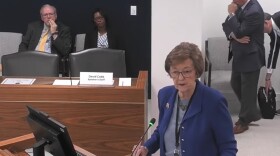Editor's note: This story has been updated with the most recent action from the state Legislature.
State Senators approved a budget Tuesday night following more than an hour of review and debate. Lawmakers voted 33 to 16 along party lines last night in support of the budget bill. Democrats criticized Republicans for not providing more money to state retirees or public schools and for being left out of the legislative process.
"There are things in there that I am not 100 percent happy about, but I would say that on balance this is the best budget I've seen in the 16 years I've been here," said Senate Pro Tem Phil Berger (R-Rockingham), adding the measure isn't perfect, but they're proud of it.
Minority leader Dan Blue (D-Wake) criticized budget writers for putting $34 million in additional funds for school vouchers, and not doing more for state retirees.
"What I see in the budget is prioritizing the wants of the budget committee, rather than the needs of the people of this state," said Blue on the Senate floor, speaking longer than any of his democratic colleagues.
The $22.3 billion budget is slightly larger than the figure lawmakers agreed to spend earlier this year. It provides a 4.7 percent raise to teachers, as well as recurring 1.5 percent raise to employees, while setting aside money for merit-based bonuses.
The Senate is scheduled to formally vote the budget through on Wednesday, and the House expects to take it up by the weekend.
Budget Announcement: Monday, June 27:
After weeks of closed-door negotiations, the House and Senate have finished a $22.3 billion dollar state budget for the fiscal year beginning Friday. Legislators detailed parts of the 235-page plan during a Monday evening news conference.
This budget provides an average raise of 4.7 percent to public school teachers, allocates about $475 million to state reserves and drops tuition at three UNC campuses - Western Carolina University, UNC-Pembroke, and Elizabeth City State University - to $500 per semester.
"Cutting taxes on the middle class, controlling the growth of government spending and bolstering our savings," concluded Senate Pro Tem Phil Berger (R-Rockingham). "It includes an overall spending increase of about 2.8 percent, and it continues the commitment made by Republican State leaders to raise teacher pay."
Under this budget, average teacher pay would climb to more than $50,000 annually for the first time in state history. Teachers have not received an across-the-board pay raise as large as this one since Republicans took control of the General Assembly in 2010.
"Look at where we were six years ago – double digit unemployment, nearly a three billion dollar budge deficit, billions in debt to the federal government, some of the highest tax rates in the southeast, and the budget today -- where taxes are the lowest in decades, where teachers are being paid more than they ever have been paid in this state," said House Speaker Tim Moore (R-Cleveland).
In those six years following a national recession, leading Republican state lawmakers have also made it a point to put more money into savings. This budget allocates about $475 for the state’s rainy day fund.
"We shored up the savings reserve fund to an absolute record level both as a percentage of the budget as well as actual dollars," House Budget writer Nelson Dollar (R-Wake) said.
This budget also includes a 1.5 percent raise for state employees, as well as a .5 percent bonus; increases the standard deduction for tax purposes, and slots $10 million into a disaster relief fund.
This was the second straight year lawmakers were working with a state surplus. This budget also will provide an increase to retired state employees, for just the second time in nearly a decade. The Senate is expected to vote on the budget Tuesday, and the House hopes to pass the bill by the end of the week and send it on to the Governor.
In other budget developments:
Jordan Lake/Falls Lake
The budget further delays the comprehensive cleanup of the two reservoirs that serve most of Wake County, and other communities. While it no longer funds a pilot project that would have put freshwater mussels in the bodies of water, it does include $1.3 million in funding to the Department of Environmental for in-lake trials and technology. It also funds a a UNC-Chapel Hill study of nutrient management strategies. Environmental advocates would prefer implementation of the Jordan Lake Rules, which have been suspended since Republicans took control of the General Assembly.
Also, an earlier provision that would have eased protections along the state's rivers and streams does not appear in the final budget.
Wright School
The Durham-based Wright School serves students from across the state. The six-to-14 year olds come to the four-day-a-week boarding school after at least two hospitalizations and three psychiatric diagnoses. Since 2010, the school has faced regular threats of closure from the Senate, only to survive once the final budget is negotiated. That happened again this session, and the Wright School will be back in business, for at least another year.
Year-Round Schools
A budget provision that would have force single-track year-round schools to change their schedules does not appear in the final budget. The effort drew intense criticism from parents and school administrators in Durham and Wake Counties, and was backed by the tourist industry.
Light Rail
A $500,000 cap on light rail projects - largely seen as an effort to hinder the proposed line between Durham and Chapel Hill - did not make the final budget. But other provisions in the budget would force the project to go through the Department of Transportation's vetting process, likely causing delays.
Follow WUNC political reporters Jeff Tiberii, Jess Clark, and Jorge Valencia on Twitter as they report from the General Assembly this week, providing regular updates on the state budget. And don't miss the WUNCPolitics podcast when it drops this Friday.












